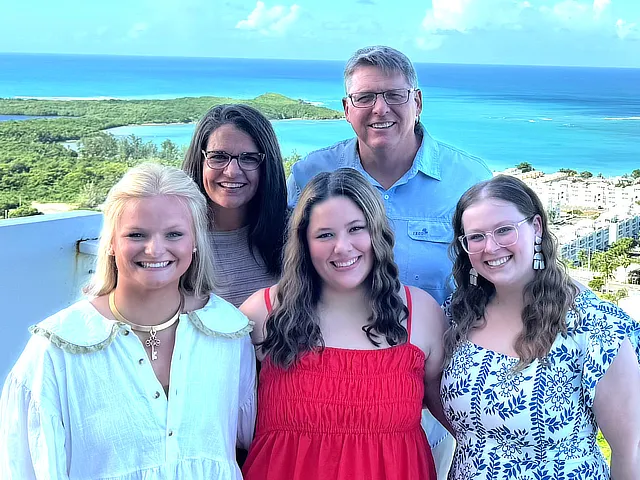
After working with college students on a college campus for more than 20 years, I actually thought I would be “living my best parent life ever” when my own daughters were finally in college. It seems silly in hindsight, but I truly believed my experience—and even my expertise—would exempt us from the struggle and stress of navigating the many transitions I knew were coming: togetherness to separateness, dependence to independence, parenting to partnering, managing to mentoring and, ultimately, adolescence to adulthood.
The reality is that struggle and stress are simply part of the process for both students and parents. We are all undergoing a transformation, and the wrestling and reflecting we do with ourselves, each other and God is purposeful in preparing us for what lies ahead. Just as the butterfly must work and struggle to emerge from its cocoon, we too must put in the effort to change and grow into new versions of ourselves—as individuals and as families.
The struggle I had hoped to avoid I now understand as necessary if I want my children to fly. In a recent reading about butterflies, I learned the importance of allowing the butterfly to do the work of escaping the cocoon itself. That process strengthens its wings for future flight. Though difficult for the impatient or empathetic to watch, helping the butterfly by cutting away the cocoon and removing the struggle would actually delay, if not destroy, its ability to fly.
This imagery and insight have helped me reframe my current reality and recommit to supporting my children in their struggle to emerge from adolescence and transform into responsible, thoughtful and beautiful adults. It has also inspired me to wrestle with my own transformation—from parent to partner, mother to mentor and empty nester to empty “nexter.”
Just as I believe that God is doing a new thing for my daughters in the chrysalis of college years, I see now that I, too, am being transformed and prepared for new flights of faith and purpose.
I could write for pages about the spiritual and emotional impact butterfly wings are having on my life at the moment, but instead I’ll invite you to reflect and assess how you are handling your own transformation—and how you are supporting your students in theirs. While they do not need us to grab the scissors and cut away the difficulty, disappointment and discomfort in their lives, they do need our encouragement and guidance. We can help without hurting. We can support without stifling. We can love while still letting go.
My husband and I want our hungry college caterpillars to have what they need for their full transformation, so we think and talk regularly about what is left for us to do, say or share in these last stages of their metamorphosis. Since starting college, our girls have made increasing references to “adulting”—some with fondness, others with disdain—but all signaling a new and growing awareness of taking responsibility for themselves.
In an effort to help them build on that experience and better prepare for the practicalities of becoming and being an adult, we compiled what we now call an adulting checklist. We circulated the list among friends with a variety of life experience—some decades, others just getting started—and made edits and additions based on their feedback. We agreed that we both could have benefited from such a list when we were preparing for our own launch into adulthood and were eager to share it with our girls.
While their initial response was shock and awe, we quickly found our way into a series of informative and insightful conversations about growing up. We had a wonderful opportunity to answer their questions and teach them things we learned they didn’t actually know yet. It felt good to put in their hands a tool they could use to inform their perspectives and plans for the future. But it felt even better to open up communication in the present that allowed us to speak over their struggles and stress our support, confidence and love—for who they already are and for the beautiful humans they are becoming.
I’m sharing our adulting checklist here in hopes that you’ll use it—as is or with your own additions and edits—to start a conversation with your student and open up space for you both to grow, struggle, change and, ultimately, fly.
Adulting Checklist
“Becoming an adult is a process of gaining authority over our lives.” — Dr. Henry Cloud
- Housing (monthly rent or mortgage, security deposit, moving and storage expenses, property taxes)
- Home repairs and improvements
- Home furnishings (furniture, appliances, decor)
- Homeowners or renters insurance
- Utilities (Wi-Fi, water, power, gas, including deposits)
- Cellphone (device and plan)
- Transportation (car payment, maintenance, gas, rentals, Uber/taxi)
- Car tag and taxes, driver’s license renewal (annual)
- Car insurance (monthly payments and deductibles)
- Food (groceries and eating out)
- Personal items (clothing, shoes, toiletries, cleaning supplies)
- Medical care:
- Medical insurance and copays
- Sick visits
- Annual checkups (general, gender-specific, dental, dermatologist)
- Medications
- Mental health care (counseling, medication)
- Important documents (birth certificate, Social Security card, car registration, passport)
- Taxes (federal, state, property, income)
- Voting
- Credit card management and balances
- Credit score (debt-to-income ratio, payment history)
- Life and disability insurance
- Financial planning and management (checking and savings accounts, retirement, budgeting, giving)
- A basic estate plan (will, durable power of attorney, health care surrogate, living will)
- Grooming (hair, nails)
- Housekeeping (laundry, yard work, cleaning)
- Continuing education (graduate school, trainings, certifications, conferences)
- Travel and vacations
- Memberships (Amazon Prime, gym, meal plans)
- Entertainment (concerts, sporting events, music subscriptions, streaming services)
- Pets
- Hobbies
- Gifts (birthdays, weddings, etc.)
